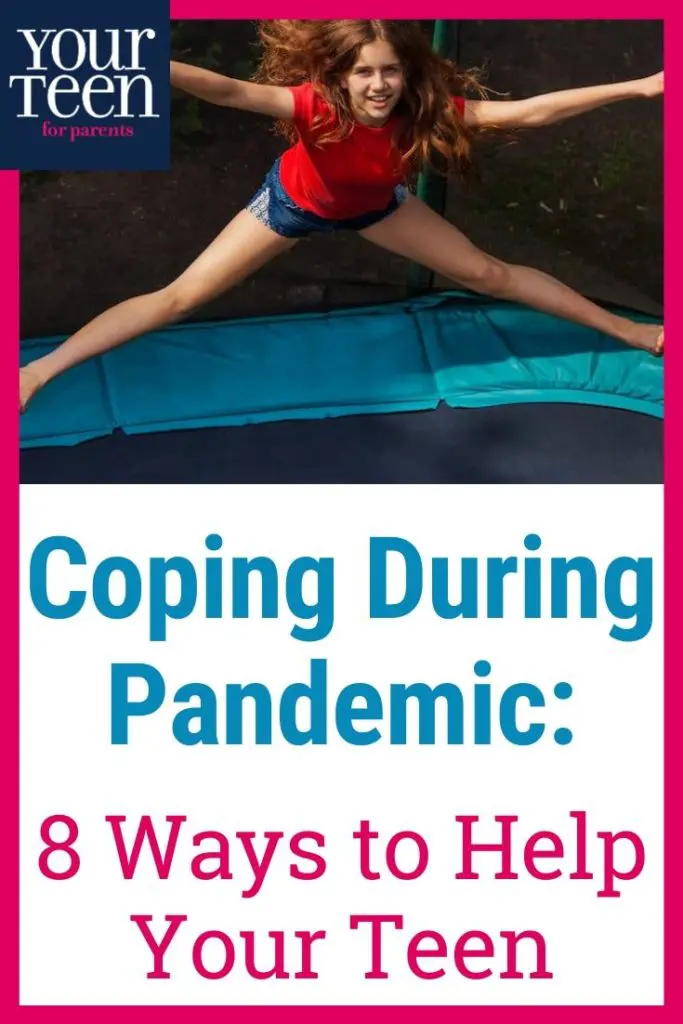She didn’t even look at me. I had asked her how she was doing, having been away from school for so long. She shrugged, said she was fine, and kept on scrolling. I wondered if maybe she really was fine with it all.
| [adrotate banner=”169″] |
I wasn’t fine. This all felt hard and different and uncertain. I fluctuated between being happy with more time at home and worried about my husband working as a nurse and paramedic. I was all over the place, but maybe my 15-year-old wasn’t struggling.
And then I heard her talking with a friend on FaceTime.
She talked fast, trying to get all the words out in one breath. Something about how hard the distance learning was and how weird things were and how desperately she missed gymnastics.
Clearly, she wasn’t as fine as she let on.
Navigating this pandemic is hard for all of us, especially teens. They are facing things like the loss of so many milestone events, lack of connection with their friends, and more. But we can help them navigate their feelings in simple ways.
How to Help Teens Cope with the Pandemic
1. Talk about it
While we want to protect our kids from hard subjects, teens are old enough to have conversations about Coronavirus and the impact it’s having on their world. Giving clear information, conveying your feelings, and giving them a chance to share theirs will help them process some of what they are hearing.
2. Talk about something else
But here’s the flip-side: we shouldn’t spend too much time talking about Coronavirus. As parents, we can help our kids find a healthy balance by chatting about other things they are interested in. While there may be changes (like a delay for their favorite baseball team) they can still talk about favorite memories and things they’re passionate about.
3. Do something together
This is the perfect time to engage with our kids, from cooking dinner together to playing games. Even reading the same book and chatting about it or watching movies we loved as teens can offer a welcome distraction and create lasting memories for everyone.
4. Reduce social media
A world without social media may not be realistic, but we can reduce how much we’re consuming. It will be healthier for our teens and for us.
5. Set media boundaries
While we are surrounded by endless coverage of the pandemic and the many ways it is affecting our world, we need to make choices that help us be informed without becoming obsessed. Setting a certain time to watch or read media coverage is a great way to strike that balance.
6. Be active
Physical activity, especially outdoors, is proven to improve mood and mental health. Go for a walk or run, shoot hoops, or even jump on the trampoline. Anything to get moving will help all of us feel better.
7. Talk plans
This isn’t about making a plan for the day (although that is helpful). This is all about dreaming. We need to encourage our teens to keep dreaming about their future. Even though the immediate future feels uncertain, being purposeful about talking about the good things they have to look forward to is a great way to offer hope in this difficult season.
8. Be present physically and emotionally
Our teens may not fit in our laps anymore, but that doesn’t mean they don’t need physical comfort from us. Make time to sit together, give a hug or put your hand on your teen’s shoulder. Physical presence goes a long way in reminding teens that they are still being cared for, they are safe, and they are loved.
It can be harder to navigate our emotional presence, but it doesn’t need to be complicated. Give your teen opportunities to talk about their feelings. We’re all feeling a range of emotions, and teens are known for needing to process them differently than adults. That’s ok. Giving them a safe place to do so will be reassuring and help them process in their own time.

Like many teens, my daughter isn’t doing as fine as she wanted me to believe. Most of us aren’t. In this time of uncertainty, our teens need to know we are here for them—and that they don’t need to walk through this alone.





